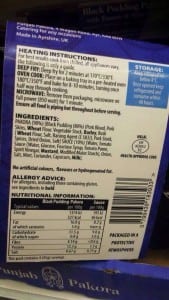 Sharia Halal Board held an emergency meeting today regarding the recent Halal issue with a Scottish food company named Punjab Pakora.
Sharia Halal Board held an emergency meeting today regarding the recent Halal issue with a Scottish food company named Punjab Pakora.
It expressed extreme disappointment both with Punjab Pakora and Aldi, the supermarket chain that was selling the product
Speaking at a held Press Conference after the meeting Allama Shahid Raza Naeemi OBE a senior panel member stated:
” We are horrified and appalled that Muslim consumers were being sold a product that could have zero possibility of being Halal. Furthermore that the meat used was from the most forbidden animal to Muslims”.
Meat from Pig is strictly forbidden in Islam and is mentioned categorically in the Holy Quran. Muslims will feel sickened at the fact that not only was the product Haram (Forbidden) but was also from pig.
Grand Mufti of United Kingdom, Mufti Abdul Rasool Mansour who is also a senior panel member stated “We will be writing to the FSA and DEFRA regarding this issue and have asked for both companies to be investigated thoroughly. An apology is simply not enough after making such a major mistake. We need to understand how this mistake occurred and what the company in question is doing to avoid such a mistake in the future”.
Senior scholar Allama Qazi Abdul Aziz Chishti, stated:
“We have trying for a while now to put a stop to self certification of factories and processing plants. This is one of the key issues that Muslims face in UK and this gives companies the right to actively mislead Muslim consumers stating a product is Halal by simply using a local religious person or in house Imam to support. This practice gives way to mess-ups such as the recent one made by Punjab Pakora. It must stop.”
President of the Central Association of Sunni Scholars and senior panel member Prof Syed Ahmed Hussain Tirmizi explained further:
“Companies knowingly employ such Muslim workers who sign off for the company stating that the product is Halal. Most of those signing or approving the meat or poultry have almost zero knowledge about what makes the product Sharia compliant and Halal.
Companies are also using this route to continue to sell machine killed poultry to Muslims across the UK when they know full well that the Muslims of UK have rejected this method as Halal.”
Senior Consultant Saraj Murtaza stated:
“All the major Halal certifiers in UK have stated officially that machine killing is unacceptable, yet by using in house companies the slaughterhouses can get away with still labeling machine killed product as Halal.
We will be lobbying the government in coming months regarding this issue. Meanwhile, we have agreed in our meeting today to immediately contact DEFRA and the FSA and ask for a detailed investigation into Punjab Pakora and to check with Aldi what methods it employs to ensure products they sell are Halal. Unlike local grocers Aldi is a major chain and should have strict policies in place.”
Sharia Halal Board thanked all the media for attending the Press Conference and asked for their continued support in helping to unearth such illegal activities.
ARTICLE TWO – 26 May 2015
Halal bodies urge further action by Food Standards Agency and Defra on wrongly labelled products
Two organisations representing Muslims have called on the government to ban food manufacturers from self-certifying foods as halal, following uproar over a ‘halal’ Aldi product which actually contained pork.
Manufacturer Punjab Pakora last week apologised for a “labelling mistake”, which led it to label its Aldi black pudding, containing pork blood and skin as halal. The product was recalled, and Aldi said customers were welcome to return the product to store for a refund.
But now, the Halal Food Authority and the Sharia Halal Board have called for an end to the practice of halal self-certification, saying it puts Muslims at risk.
“We have been trying for a while now to put a stop to self-certification of factories and processing plants,” said Allama Qazi Abdul Aziz Chishti, from the Sharia Halal Board. “This is one of the key issues that Muslims face in UK and this gives companies the right to actively mislead Muslim consumers, stating a product is halal by simply using a local religious person or in house imam for support. This practice gives way to mess-ups such as the recent one made by Punjab Pakora. It must stop.”
Abdul Rasool Mansoor Al-Azhari, also from the Sharia Halal Board, added: “We will be writing to the Food Standards Agency and Defra regarding this issue and have asked for both companies to be investigated thoroughly. An apology is simply not enough after making such a major mistake. We need to understand how this mistake occurred and what the company in question is doing to avoid such a mistake in the future.”
Zena Butt, spokeswoman from the Halal Food Authority, told Meat Trades Journal, her organisation backed compulsory outsourcing of halal certification. “We have always disputed self-certification,” she said. “In terms of the response issued by Aldi and Punjab Pakora – though the labelling of halal seems to have been a genuine mistake – there are no compromises when it comes to faith. There will be no way to tell how many Muslims unknowingly ate this product without questioning its halal suitability. Unfortunately, halal is not protected by the government so it is on all our hands to ensure that a situation like this does not arise again.”



